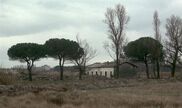In fact, it’s still a matter of taking notes, but I moved to this place because of the limited number of words for short reviews. I took this title because I was chatting with a friend last night. She posted Brother Xun's article "After Nora Runs away" as an example, although it was about the art exam between us, after I watched this movie, I didn't like it. Both Na and Nora have inspired me.
The voiceover in the opening chapter mentions the last winter, which reminds me of the sentence about Mrs. Xianglin at the beginning of "Blessing". The shot of "I think she's from the sea" is really like the Ama described by Le Clézio in "Heavy Rain"... The interval between blackened transitions is not long, documentary-style video narrative. Girls who fetch water are free. Pitch a tent in a cemetery. I love every frame of her walking in the fields, that's where she ends up. "Are you looking at me, or my sandwich?" "Your sandwich." "Too bad." There's a scene in the movie where a woman burns something in a field, and smoke rises, constantly rising from below the slowly rising camera. come up. That's the flow of emotions, and what art is more captivating than moving images like cinema. Sleeping on the street, there are wanderers who do not have a meal, but in this movie it is a very pure thing and a process. It never thought to delve into a certain topic and metaphor of realism, it is a free and open twenty-four frames dedicated to Varda. Just because it doesn't go deep doesn't mean it doesn't. Varda's attention to the homeless group is all revealed in the details, just like the longer and most "kind" professor of agriculture. (If in the city, I would call it the flâneu wanderer of Benjamin's words) The tree fell, and I was reminded of the Rohmer movie.
The radish greenhouse made me wonder what would happen if Li Cangdong's "Burning" was made into a stray movie. Everyone who interacts with Mona has interview-style images facing the camera, expressing words of sympathy or disgust, only Assoun bows his head and kisses the red scarf without saying a word. We watched her die step by step. Do we stand on some commanding heights and examine it, or do we actually try to empathize? I think the answer is not self-evident in our minds. We are wrapped in warmth, surrounded by material and at the same time form a protective circle of estrangement and layering, we master our own words, and obey a certain social system... It is difficult for the real homeless on the road to see this movie. However, it gave me a lot of courage.
View more about Vagabond reviews











